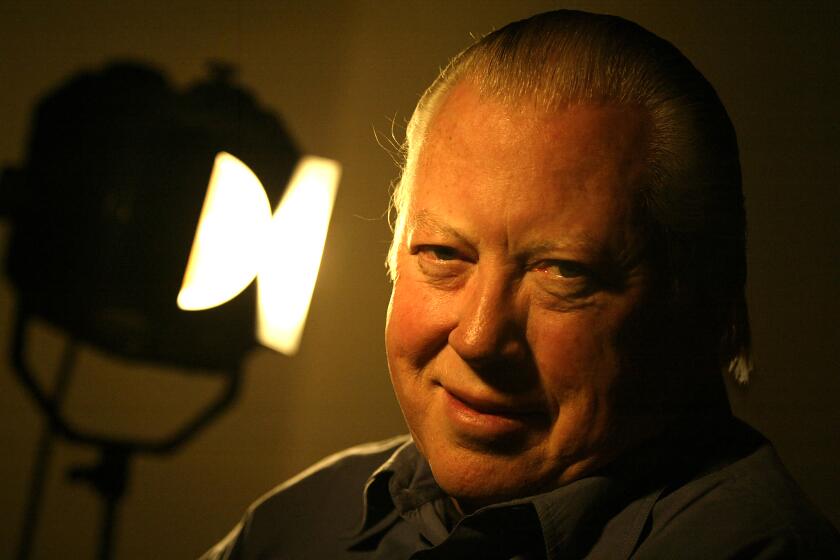‘Hero’ worshipers
“EVERYONE’S Hero” is an unusual film in many ways. It manages to be rated G without the aid of talking animals or singing princesses. Neither does it rely on multilayered sarcasm, pop culture references, camp or the ability of a lead character to channel Ed McMahon, Julia Child and/or Elvis.
Instead the Fox animated film is the straightforward, heart-on-its-sleeve story of a boy who must find and return Babe Ruth’s stolen bat (OK, there is a talking baseball and a talking bat, but no animals were anthropomorphized in the making of this film) though it means traveling from New York to Chicago on his own and encountering all sorts of disparate characters -- from hobos to bullies to stars of the Negro Baseball League.
“Everyone’s Hero,” which opens today, also raises the bar of the Hollywood back story to a new level of poignancy. Every film is someone’s dream, often with a making-of narrative just as funny, dramatic, tragic or bittersweet as the film itself, but it’s hard to imagine one that will top this one’s any time soon. Written by Rob Kertz from a story that IDT Entertainment founder Howard Jonas told his children at bedtime, “Everyone’s Hero” was the final project of Christopher Reeve. The actor turned director, who continued to work in Hollywood despite his catastrophic fall in 1995 from a horse that left him a quadriplegic, was taken by the story of young Yankee Irving: that no matter how bleak things look, you have to just keep swinging.
“Howard brought it to Chris because in Howard’s mind, Chris is one of the last great American heroes,” says Kertz, who worked closely with Reeve on the story for eight months. “One of the most inspirational and glorious parts of working with Chris was how normal it was. He was a man who loved to laugh and who really believed in the story.”
Reeve was in the midst of script revisions and storyboarding when he died unexpectedly in October 2004. After his death, Dana Reeve, who also voiced the mother in the film, took up the banner of executive producer in an effort to ensure that her husband’s vision of the film would become his final legacy. Her death to cancer in March of this year made those involved even more determined to see the project through.
“Chris wanted it to be finished,” says William H. Macy, who voices Lefty, the villainous pitcher who steals Ruth’s bat in an effort to defeat the Yankees in the World Series, “and so everyone pretty much said ‘it will be done.’ ”
Macy is part of a cast with a collective wattage -- Rob Reiner, Whoopi Goldberg, Mandy Patinkin, Robin Williams and Brian Dennehy -- that reflects more the admiration many in Hollywood felt for Reeve than the film’s budget, or even its ambitions.
“Chris kept saying he didn’t want this to be ‘Shrek,’ ” Kertz says. “He wanted it to be a small movie about a father and son and the power of perseverance.”
Macy, who knew Reeve back in their shared Juilliard days -- “He was this impossibly tall, handsome, talented guy; oh how we all hated him” -- was approached to join the cast after Reeve’s death. “It came to me as a project that had been his,” Macy says. “And it clearly had his spirit, his message.”
For Reiner, who voices Screwie, the cynical, wisecracking baseball that accompanies Yankee on his journey, the film combined pretty much everything he loved: kids, baseball, humor and a chance to honor a friend.
Reeve’s death, he says, “emboldened us to get this project done, to get that message out. It wasn’t just his personal courage,” Reiner says of Reeve, “but his advocacy on the part of so many people, how he moved stem cell research up the national agenda pretty much single-handedly.”
Although Reeve had worked with Kertz and animators for many months, and along with Colin Brady and Daniel St. Pierre is credited as directing the film, much of the work, including all of the voice recording, actual animation and some script revision was done after his death. Goldberg’s role as Darlin’, the purloined bat, was added for humor and texture, although Kertz says he and Reeve had discussed the possibility of a talking bat.
‘True to the period’
What didn’t change, says producer Ron Tippe, was the tone and the vision of the film.
“Chris said, ‘I don’t want to make a cartoon, I want to make a movie,’ ” Tippe says. “He wanted to take chances. Like the way the Negro Baseball League is portrayed in the movie. Chris wanted to do something true to the period. Some people would have said no, that kind of thing doesn’t belong in this movie, but Chris wanted to show how it was back then.”
With Reeve as a model, Tippe says, everyone was able to push harder, get the film done faster; animated films are famously complicated because of all their moving parts and the high concept of some of the characters. Reiner had done animated work for television, but he was still surprised at how strange the process is. “There you are, all by yourself, saying your lines, trying to be funny. There’s not a heck of a lot of research on how to play a ball,” he adds, with a laugh. “I talked to a lot of balls, game balls, practice balls, got different points of view and, you know, the ball gets a bum rap a lot of the time.”
More important, Kertz says, Reeve’s formidable reputation helped the filmmakers maintain the story’s original tone despite the overwhelming forces of today’s marketplace.
“At one point, someone suggested making Yankee a squirrel,” he says. “Because that’s what kids films these days are full of -- sarcastic animals. But Chris wanted it to be about kids, he wanted it to be a story for his son Will, about a real family, about a father and a son.”
The decision to have Yankee come from a loving home, rather than using a more typical orphan-adventure scenario, was very conscious on both Kertz’s and Reeve’s part. “In the end, it’s a happy story,” Kertz says. “The mom and dad are still alive, the kid is a good kid. We’ll be able to walk out of the premiere and say to Chris, ‘It’s a good movie, I know you’d like it.’ ”
More to Read
Only good movies
Get the Indie Focus newsletter, Mark Olsen's weekly guide to the world of cinema.
You may occasionally receive promotional content from the Los Angeles Times.







